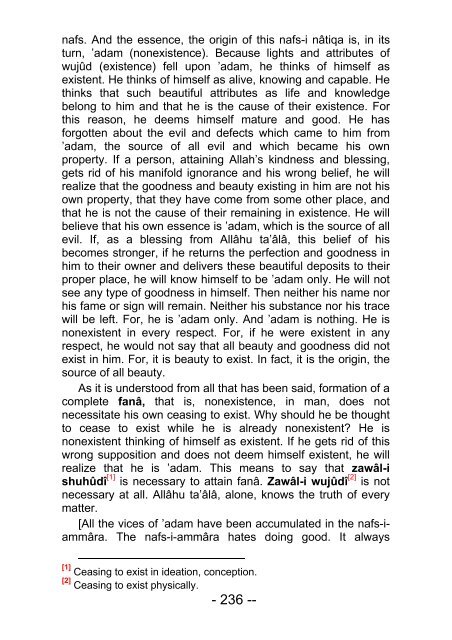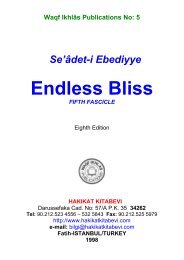3-Endless Bliss Third Fascicle - Hakikat Kitabevi
3-Endless Bliss Third Fascicle - Hakikat Kitabevi
3-Endless Bliss Third Fascicle - Hakikat Kitabevi
Create successful ePaper yourself
Turn your PDF publications into a flip-book with our unique Google optimized e-Paper software.
nafs. And the essence, the origin of this nafs-i nâtiqa is, in its<br />
turn, ’adam (nonexistence). Because lights and attributes of<br />
wujûd (existence) fell upon ’adam, he thinks of himself as<br />
existent. He thinks of himself as alive, knowing and capable. He<br />
thinks that such beautiful attributes as life and knowledge<br />
belong to him and that he is the cause of their existence. For<br />
this reason, he deems himself mature and good. He has<br />
forgotten about the evil and defects which came to him from<br />
’adam, the source of all evil and which became his own<br />
property. If a person, attaining Allah’s kindness and blessing,<br />
gets rid of his manifold ignorance and his wrong belief, he will<br />
realize that the goodness and beauty existing in him are not his<br />
own property, that they have come from some other place, and<br />
that he is not the cause of their remaining in existence. He will<br />
believe that his own essence is ’adam, which is the source of all<br />
evil. If, as a blessing from Allâhu ta’âlâ, this belief of his<br />
becomes stronger, if he returns the perfection and goodness in<br />
him to their owner and delivers these beautiful deposits to their<br />
proper place, he will know himself to be ’adam only. He will not<br />
see any type of goodness in himself. Then neither his name nor<br />
his fame or sign will remain. Neither his substance nor his trace<br />
will be left. For, he is ’adam only. And ’adam is nothing. He is<br />
nonexistent in every respect. For, if he were existent in any<br />
respect, he would not say that all beauty and goodness did not<br />
exist in him. For, it is beauty to exist. In fact, it is the origin, the<br />
source of all beauty.<br />
As it is understood from all that has been said, formation of a<br />
complete fanâ, that is, nonexistence, in man, does not<br />
necessitate his own ceasing to exist. Why should he be thought<br />
to cease to exist while he is already nonexistent? He is<br />
nonexistent thinking of himself as existent. If he gets rid of this<br />
wrong supposition and does not deem himself existent, he will<br />
realize that he is ’adam. This means to say that zawâl-i<br />
shuhûdî [1] is necessary to attain fanâ. Zawâl-i wujûdî [2] is not<br />
necessary at all. Allâhu ta’âlâ, alone, knows the truth of every<br />
matter.<br />
[All the vices of ’adam have been accumulated in the nafs-iammâra.<br />
The nafs-i-ammâra hates doing good. It always<br />
[1] Ceasing to exist in ideation, conception.<br />
[2] Ceasing to exist physically.<br />
- 236 -











